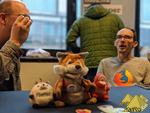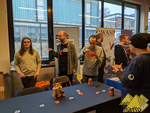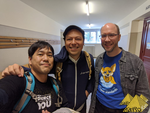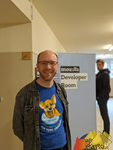The roads I take...
KaiRo's weBlog
| Zeige die letzten Beiträge auf Englisch und mit "community" gekennzeichnet an. Zurück zu allen aktuellen Beiträgen | |||||||||||||||||||||||||||||||||||||||||||
27. Februar 2022
Connecting the Mozilla Community
After some behind-the-scenes discussions with Michael Kohler on what I could contribute at this year's FOSDEM, I ended up doing a presentation about my personal Suggestions for a Stronger Mozilla Community (video is available on the linked page). While figuring out the points I wanted to talk about and assembling my slides for that talk, I realized that one of the largest issues I'm seeing is that the Mozilla community nowadays feels very disconnected to me, like several islands, within each there is good stuff being done, but most people not knowing much about what's happening elsewhere. That has been helped a lot by a lot of interesting projects being split off Mozilla into separate projects in recent years (see e.g. Coqui, WebThings, and others) - which is often taking them off the radar of many people even though I still consider them as being part of this wider community around the Mozilla Manifesto and the Open Web.
Following the talk, I brought that topic to the Reps Weekly Call this last week (see linked video), esp. focusing on one slide from my FOSDEM talk that talks about finding some kind of communication channel to cross-connect the community. As Reps are already a somewhat cross-function community group, my hope is that a push from that direction can help getting such a channel in place - and figuring out what exactly is a good idea and doable with the resources we have available (I for example like the idea of a podcast as I like how those can be listened to while traveling, cooking, doing house work, and others things - but it would be a ton of work to organize and produce that).
Some ideas that came up in the Reps Call were for example a regular newsletter on Mozilla Discourse in the style of the MoCo-internal "tl;dr" (which Reps have access to via NDA), but as something that is public, as well as from and for the community - or maybe morphing some Reps Calls regularly into some sort of "Community News" calls that would highlight activities around the wider community, even bringing in people from those various projects/efforts there. But there may be more, maybe even better ideas out there.
To get this effort to the next level, we agreed that we'll first get the discussion rolling on a Discourse thread that I started after the meeting and then probably do a brainstorming video call. Then we'll take all that input and actually start experimenting with the formats that sound good and are practically achievable, to find what works for us the best way.
If you have ideas or other input on this, please join the conversation on Discourse - and also let us know if you can help in some form!
Following the talk, I brought that topic to the Reps Weekly Call this last week (see linked video), esp. focusing on one slide from my FOSDEM talk that talks about finding some kind of communication channel to cross-connect the community. As Reps are already a somewhat cross-function community group, my hope is that a push from that direction can help getting such a channel in place - and figuring out what exactly is a good idea and doable with the resources we have available (I for example like the idea of a podcast as I like how those can be listened to while traveling, cooking, doing house work, and others things - but it would be a ton of work to organize and produce that).
Some ideas that came up in the Reps Call were for example a regular newsletter on Mozilla Discourse in the style of the MoCo-internal "tl;dr" (which Reps have access to via NDA), but as something that is public, as well as from and for the community - or maybe morphing some Reps Calls regularly into some sort of "Community News" calls that would highlight activities around the wider community, even bringing in people from those various projects/efforts there. But there may be more, maybe even better ideas out there.
To get this effort to the next level, we agreed that we'll first get the discussion rolling on a Discourse thread that I started after the meeting and then probably do a brainstorming video call. Then we'll take all that input and actually start experimenting with the formats that sound good and are practically achievable, to find what works for us the best way.
If you have ideas or other input on this, please join the conversation on Discourse - and also let us know if you can help in some form!
Von KaiRo, um 18:15 | Tags: community, FOSDEM, Mozilla, Reps | keine Kommentare | TrackBack: 1
6. Februar 2020
FOSDEM, and All Those 20's
I've been meaning to blog again for some time, and just looked in disbelief at the date of my last post. Yes, I'm still around. I hope I get to write more often in the future.
Ludo just posted his thoughts on FOSDEM, which I also attended last weekend as a volunteer for Mozilla. I have been attending this conference since 2002, when it first went by that exact name, and since then AFAIK only missed the 2010 edition, giving talks in the Mozilla dev room almost every year - though funnily enough, in two of the three years where I've been a member of the Mozilla Tech Speakers program, my talks were not accepted into that room, while I made it all the years before. In fact, that's more telling a story of how interested speakers are in getting into this room nowadays, while in the past there were probably fewer submissions in total. So, this year I helped out Sunday's Mozilla developer room by managing the crowd entering/leaving at the door(s), similar to what I did in the last few years, and given that we had fewer volunteers this year, I also helped out at the Mozilla booth on Saturday. Unfortunately, being busy volunteering on both days meant that I did not catch any talks at all at the conference (I hear there were some good ones esp. in our dev room), but I had a number of good hallway and booth conversations with various people, esp. within the Mozilla community - be it with friends I had not seen for a while, new interesting people within and outside of Mozilla, or conversations clearing up lingering questions.




(pictures by Rabimba & Bob Chao)
Now, this was the 20th conference by the FOSDEM team (their first one went by "OSDEM", before they added the "F" in 2002), and the number 20 is coming up for me all over the place - not just that it works double duty in the current year's number 2020, but even in the months before, I started my row of 20-year anniversaries in terms of my Mozilla contributions: first bug reported in May, first contribution contact in December, first German-language Mozilla suite release on January 1, and will will continue with the 20th anniversaries of my first patches to shared code this summer - see 'My Web Story' post from 2013 for more details. So, being part of an Open-Source project with more than 20 years of history, celebrating a number of 20th anniversaries in that community, I see that number popping up quite a bit nowadays. Around the turn of the century/millennium, a lot of change happened, for me personally but all around as well. Since then, it has been a whirlwind, and change is the one constant that really stayed with me and has become almost a good friend. A lot of changes are going on in the Mozilla community right now as well, and after a bit of a slump and trying to find my new place in this community (since I switched back from staff to volunteer in 2016), I'm definitely excited again to try and help building this next chapter of the future with my fellow Mozillians.
There's so much more going around in my mind, but for now I'll leave it at that: In past times, when I was invited as volunteer or staff, the Mozilla Summits and All-hands were points that energized me and gave me motivation to push forward on making Mozilla better. This year, FOSDEM, with my volunteering and the conversations I had, did the same job. Let's build a better Internet and a better Mozilla community!
Ludo just posted his thoughts on FOSDEM, which I also attended last weekend as a volunteer for Mozilla. I have been attending this conference since 2002, when it first went by that exact name, and since then AFAIK only missed the 2010 edition, giving talks in the Mozilla dev room almost every year - though funnily enough, in two of the three years where I've been a member of the Mozilla Tech Speakers program, my talks were not accepted into that room, while I made it all the years before. In fact, that's more telling a story of how interested speakers are in getting into this room nowadays, while in the past there were probably fewer submissions in total. So, this year I helped out Sunday's Mozilla developer room by managing the crowd entering/leaving at the door(s), similar to what I did in the last few years, and given that we had fewer volunteers this year, I also helped out at the Mozilla booth on Saturday. Unfortunately, being busy volunteering on both days meant that I did not catch any talks at all at the conference (I hear there were some good ones esp. in our dev room), but I had a number of good hallway and booth conversations with various people, esp. within the Mozilla community - be it with friends I had not seen for a while, new interesting people within and outside of Mozilla, or conversations clearing up lingering questions.
(pictures by Rabimba & Bob Chao)
Now, this was the 20th conference by the FOSDEM team (their first one went by "OSDEM", before they added the "F" in 2002), and the number 20 is coming up for me all over the place - not just that it works double duty in the current year's number 2020, but even in the months before, I started my row of 20-year anniversaries in terms of my Mozilla contributions: first bug reported in May, first contribution contact in December, first German-language Mozilla suite release on January 1, and will will continue with the 20th anniversaries of my first patches to shared code this summer - see 'My Web Story' post from 2013 for more details. So, being part of an Open-Source project with more than 20 years of history, celebrating a number of 20th anniversaries in that community, I see that number popping up quite a bit nowadays. Around the turn of the century/millennium, a lot of change happened, for me personally but all around as well. Since then, it has been a whirlwind, and change is the one constant that really stayed with me and has become almost a good friend. A lot of changes are going on in the Mozilla community right now as well, and after a bit of a slump and trying to find my new place in this community (since I switched back from staff to volunteer in 2016), I'm definitely excited again to try and help building this next chapter of the future with my fellow Mozillians.
There's so much more going around in my mind, but for now I'll leave it at that: In past times, when I was invited as volunteer or staff, the Mozilla Summits and All-hands were points that energized me and gave me motivation to push forward on making Mozilla better. This year, FOSDEM, with my volunteering and the conversations I had, did the same job. Let's build a better Internet and a better Mozilla community!
Von KaiRo, um 14:02 | Tags: community, FOSDEM, Mozilla, Tech Speakers | keine Kommentare | TrackBack: 1
22. August 2014
Mirror, Mirror: Trek Convention and FLOSS Conferences
It's been a while since I did any blogging, but that doesn't mean I haven't been doing anything - on the contrary, I have been too busy to blog, basically. We had a few Firefox releases where I scrambled until the last day of the beta phase to make sure we keep our crash rates as low as our users probably expect by now, I did some prototyping work on QA dashboards (with already-helpful results and more to come) and helped in other process improvements on the Firefox Quality team, worked with different teams to improve stability of our blocklist ping "ADI" data, and finally even was at a QA work week and a vacation in the US. So plenty of stuff done, and I hope to get to blog about at least some pieces of that in the next weeks and months.
That said, one major part of my recent vacation was the Star Trek Las Vegas Convention, which I attended the second time after last year. Since back then, I wanted to blog about some interesting parallels I found between that event (I can't compare to other conventions, as I've never been to any of those) and some Free, Libre and Open Source Software (FLOSS) conferences I've been to, most notably FOSDEM, but also the larger Mozilla events.
Of course, there's the big events in the big rooms and the official schedule - on the conferences it's the keynotes and presentations of developers about what's new in their software, what they learned or where we should go, on the convention it's actors and other guests talking about their experiences, what's new in their lives, and entertaining the crowd - both with questions from the audience. Of course, the topics are wildly different. And there's booths at both, also quite a bit different, as it's autograph and sales booths on one side, and mainly info booths on the other, though there are geeky T-shirts sold at both types of events.
The largest parallels I found, though, are about the mass of people that are there:
For one thing, the "hallway track" of talking to and meeting other attendees is definitely a main attraction and big piece of the life of the events on both "sides" there. Old friendships are being revived, new found, and the somewhat geeky commonalities are being celebrated and lead to tons of fun and involved conversations - not just the old fun bickering between vi and emacs or Kirk and Picard fans (or different desktop environments / different series and movies).
For the other, I learned that both types of events are in the end more about the "regular" attendees than the speakers, even if the latter end up being featured at both. Especially the recurring attendees go there because they want to meet and interact with all the other people going there, with the official schedule being the icing on the cake, really. Not that it would be unimportant or unneeded, but it's not as much the main attraction as people on the outside, and possibly even the organizers, might think. Also, going there means you do for a few days not have to hide your "geekiness" from your surroundings and can actively show and celebrate it. There's also some amount of a "do good" atmosphere in both those communities.
And both events, esp. the Trek and Mozilla ones, tend to have a very inclusive atmosphere of embracing everyone else, no matter what their physical appearance, gender or other social components. And actually, given how deeply that inclusive spirit has been anchored into the Star Trek productions by Gene Roddenberry himself, this might even run deeper in the fans there than it is in the FLOSS world. Notably, I saw a much larger amount of women and of colored people on the Star Trek Conventions than I see on FLOSS conferences - my guess is that at least a third of the Trek fans in Las Vegas were female, for example. I guess we need some more role models in they style of Nichelle Nichols and others in the FLOSS scene.
All in all, there's a lot of similarities and still quite some differences, but quite a twist on an alternate universe like it's depicted in Mirror, Mirror and other episodes - here it's a different crowd with a similar spirit and not the same people with different mindsets and behaviors.
As a very social person, I love attending and immersing myself in both types of events, and I somewhat wonder if and how we should have some more cross-pollination between those communities.
I for sure will be seen on more FLOSS and Mozilla events as well as more Star Trek conventions!
That said, one major part of my recent vacation was the Star Trek Las Vegas Convention, which I attended the second time after last year. Since back then, I wanted to blog about some interesting parallels I found between that event (I can't compare to other conventions, as I've never been to any of those) and some Free, Libre and Open Source Software (FLOSS) conferences I've been to, most notably FOSDEM, but also the larger Mozilla events.
Of course, there's the big events in the big rooms and the official schedule - on the conferences it's the keynotes and presentations of developers about what's new in their software, what they learned or where we should go, on the convention it's actors and other guests talking about their experiences, what's new in their lives, and entertaining the crowd - both with questions from the audience. Of course, the topics are wildly different. And there's booths at both, also quite a bit different, as it's autograph and sales booths on one side, and mainly info booths on the other, though there are geeky T-shirts sold at both types of events.
The largest parallels I found, though, are about the mass of people that are there:
For one thing, the "hallway track" of talking to and meeting other attendees is definitely a main attraction and big piece of the life of the events on both "sides" there. Old friendships are being revived, new found, and the somewhat geeky commonalities are being celebrated and lead to tons of fun and involved conversations - not just the old fun bickering between vi and emacs or Kirk and Picard fans (or different desktop environments / different series and movies).
For the other, I learned that both types of events are in the end more about the "regular" attendees than the speakers, even if the latter end up being featured at both. Especially the recurring attendees go there because they want to meet and interact with all the other people going there, with the official schedule being the icing on the cake, really. Not that it would be unimportant or unneeded, but it's not as much the main attraction as people on the outside, and possibly even the organizers, might think. Also, going there means you do for a few days not have to hide your "geekiness" from your surroundings and can actively show and celebrate it. There's also some amount of a "do good" atmosphere in both those communities.
And both events, esp. the Trek and Mozilla ones, tend to have a very inclusive atmosphere of embracing everyone else, no matter what their physical appearance, gender or other social components. And actually, given how deeply that inclusive spirit has been anchored into the Star Trek productions by Gene Roddenberry himself, this might even run deeper in the fans there than it is in the FLOSS world. Notably, I saw a much larger amount of women and of colored people on the Star Trek Conventions than I see on FLOSS conferences - my guess is that at least a third of the Trek fans in Las Vegas were female, for example. I guess we need some more role models in they style of Nichelle Nichols and others in the FLOSS scene.
All in all, there's a lot of similarities and still quite some differences, but quite a twist on an alternate universe like it's depicted in Mirror, Mirror and other episodes - here it's a different crowd with a similar spirit and not the same people with different mindsets and behaviors.
As a very social person, I love attending and immersing myself in both types of events, and I somewhat wonder if and how we should have some more cross-pollination between those communities.
I for sure will be seen on more FLOSS and Mozilla events as well as more Star Trek conventions!
Von KaiRo, um 17:09 | Tags: community, FOSDEM, Las Vegas, Mozilla, Star Trek | keine Kommentare | TrackBack: 0
